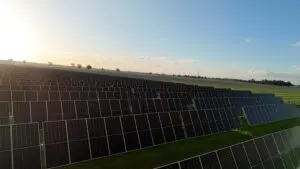California is swiftly advancing, with one EV-charging-friendly bill after another. The latest is via the California Building Code (CBC2016), which looks set to require that all recently constructed parking lots or housing must be ready for electric charging infrastructure. The information is from draft building code documents and written in legal terms.
“The new building code requirements don’t specify charging station installation, just the conduit and electrical system calculations required to prepare for charging stations,” The Long Tail Pipe reports.
The new building code essentially makes it easy to install a charging station by removing all common obstacles. Presently, The Long Tail Pipe reports, “any EVSE installation might require trenching to run new conduit to carry electrical wiring, plus upgrades to the service panel so it can supply enough power to run the charging stations. If needed, they are very expensive additions to a charging station installation. The new building code requirements will make sure the conduit and service panel capacity is already there. With that in place, it will more-or-less just be a matter of running wires and bolting charging stations into place.”
California’s work towards fewer emissions and clearer air is rapid. This is similar to a move last year to put similar requirements in place in Palo Alto, where all homes were required to come pre-wired for 240-volt, level-two, in-home chargers. This is a simple and easy thing that only adds about $200 to the overall cost of a new home and is a fraction of what retrofitting a home for such a purpose would cost.
The Long Tail Pipe continues: “A slide deck from the California Building Standards Commission goes over upcoming updates to the Building Code. These updates cover a whole gamut of things, including electric vehicle service equipment (EVSE) support.” Further in the story, The Long Tail Pipe points out: “A September 2014 report to the California Legislature, by the Department of Housing and Community Development, has an excellent summary of the new requirements.”
A few weeks ago, a California bill that allows renters to install electric car charging stations, Assembly Bill (AB) 2565, was signed into law. The goal of 1.5 million zero-emission vehicles by 2025 is closing in. This breaks up rental apartment restrictions that were barriers to continued electric car growth.
This also follows the launch of California’s “Charge Ahead” program. This program addresses lower-income family needs and increases the moderate-income family’s ability to make the switch to an electric vehicle. The bill has credit enhancement programs to help families with credit deficiency. Electric cars can save families a lot of money, but they typically come with a higher upfront price tag. The bill also includes vouchers for transit passes and car-sharing programs.
Source: CleanTechnica. Reproduced with permission.









